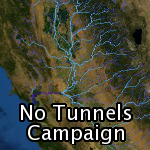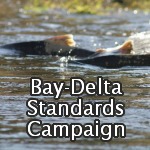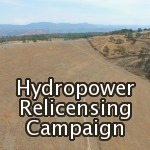Document and Comments Library
Blogs and Background
The Delta Reform Act and the Delta Stewardship Council
Thirty plus years of failure by state and federal agencies to protect the Delta and balance competing demands for limited water resources led the State Legislature to enact the Delta Reform Act of 2009 (Act). The Act created and directed the Delta Stewardship Council (Council) to develop a legally enforceable Delta Plan to achieve the coequal goals of “providing a more reliable water supply for California” and “protecting, restoring, and enhancing the Delta ecosystem” in a manner that “protects and enhances the unique cultural, recreational, natural resource, and agricultural values of the Delta as an evolving place.” The Act also established a state policy of promoting regional self-sufficiency and reduced reliance on the Delta in meeting California’s future water supply needs.
The Council is made up of seven members and oversees the Executive Director, who directs an extensive staff. A 10-member Independent Science Board appointed by the Council advises them.
Fisheries Collapse
Construction of the state and federal water export facilities in the Delta led to a collapse of the aquatic ecosystems in the Bay-Delta estuary and its tributary rivers. Despite myriad administrative proceedings by the State Water Resources Control Board, CalFed, biological opinions and lawsuits, fisheries continue to plummet.
Winter-run and Spring-run Chinook salmon, steelhead, Delta smelt, longfin smelt and green Sturgeon are listed as endangered or threatened pursuant to state and federal endangered species acts. Populations of Fall-run and late Fall-run Chinook salmon are a fraction of historic numbers.
California Department of Fish and Wildlife indices of pelagic species like American shad, splittail, threadfin shad, Delta and longfin smelt and striped bass are at historic or near historic lows. Numbers of native zooplankton and phytoplankton that comprise the lower food chain have been reduced by one to two magnitude (90-99%). Distinguished fisheries scientist, Peter Moyle, estimates that 83% of California’s freshwater fishes are extinct or at risk of becoming so.
Delta Plan
The Delta Plan will function as a strategic document providing guidance and recommendations to cities, counties, and State, federal, and local agencies on how to restore the Delta ecosystem and provide a more reliable water supply for California. It contains regulatory policies and establishes a certification process for proposed projects to comply with the Delta Plan and envisions incorporation of other “completed” plans into the Delta Plan. If the Bay Delta Conservation Plan (BDCP) is approved, Jerry Brown’s scheme to divert the Sacramento River through giant tunnels under the Delta will become part of the Delta Plan.
Irreconcilable Goals
CSPA strenuously opposed the Delta Reform Act during the legislative hearings because it failed to adequately define what was meant by “co-equal goals” and provided for BDCP to be incorporated into the Delta Plan if approved.
As defined, the “co-equal goals” are irreconcilable. Legal rights to Central Valley water (153.7 MAF) exceed the average unimpaired flow (30 MAF) five-fold. California is in a water crisis because we have over promised, wasted and inequitably distributed limited water supplies. The Delta is in a biological meltdown because the estuary has been deprived of more than half of its historical flow; its hydrograph (timing of flows) has been turned on its head and its waterways used as sewers.
Resolving California’s water crisis depends upon eliminating the waste and unreasonable use of water and putting water to its highest multiple beneficial uses. Delta restoration depends upon returning to a more natural hydrograph and increasing through-Delta flow to San Francisco Bay. Increased outflow translates to lower water exports for the state and federal water projects. CSPA believes there are viable cost-effective solutions that would reduce dependence on the Delta, provide greater water supply security, increase local self-reliance and restore the Delta.
However, the Delta cannot be restored if water exports to Southern California continue at present levels. The status quo has created both a water supply crisis and a systemic collapse of Central Valley fisheries. BDCP would be a death sentence for the Delta if it were incorporated into the Delta Plan: you can’t restore an estuary hemorrhaging from a lack of flow by depriving it of more water.
Development of the Delta Plan
Development of the Delta Plan was a lengthy, expensive time-consuming process. CSPA was deeply involved throughout the proceeding. A representative, but by no means complete, selection of our comments is included in the Document and Comment Library in this section.
- The initial Administrative Draft Delta Plan was released February 2011 followed by subsequent drafts in March, April, May, June and August 2011. A proposed Final Draft Delta Plan was released in September 2012 and the formal public review Final Draft was released in November 2012 for a 45-day comment period, ending 14 January 2013. CSPA submitted detailed testimony and comments on the drafts and final Delta Plan.
- A Notice of Preparation for the Draft Programmatic Environmental Impact Report (PEIR) for the Delta Plan in December 2010. The Administrative Draft of the Draft PEIR was circulated in June 2011 and followed by a public review draft in November 2011. A recirculated PEIR was released in November 2012 for a 45-day comment period ending 14 January 2013. Again, CSPA submitted extensive comments on the drafts and final PEIR.
- A Notice of Proposed Rulemaking and Draft Regulations was released in November 2012 and a public hearing was conducted in January 2013. The Draft Regulations were recirculated for an additional 15-days of public comments in April 2013.
The Council conducted a public hearing on 16-17 May 2013 and certified the PEIR and adopted both the Delta Plan and Regulations. CSPA attended and testified at the adoption hearing.
A Lost Opportunity
Throughout the development of the Delta Plan, CSPA worked closely with commercial and recreational fishing groups and environmental organizations, as well as Delta farmers and communities. We urged the Council to define the “co-equal goals;” provide quantifiable yardsticks and mileposts for achieving the goals; establish consequences for failing to make progress toward achieving the goals and to undertake a series of analyses crucial to providing the information and framework necessary to resolving California’s water crisis.
These critical analyses include a:
- Water availability analysis that is essential to separating real water from paper water and addressing the legal rights to it.
- Comprehensive benefit/cost analysis of water use indispensable for maximizing the use of limited resources for the greatest good for all Californians.
- Public trust analysis crucial for ensuring the at the common property rights of all Californians are protected and balanced against those of special interests.
- Water quality analysis to evaluate the impacts to pollutant concentration and residence time from diverting additional water around an already degraded estuary.
Unfortunately, bowing to political pressure, the Council squandered a marvelous and unique opportunity. Because they refused to conduct necessary studies and failed to identify and analyze the root causes of California’s water crisis, the Plan and PEIR are little more than a ratification of an unsustainable status quo. They largely recommend that agencies should continue to do the same things that created the crisis in the first place.
Inevitable Litigation
On 17 June 2013, CSPA joined with the California Water Impact Network, AquAlliance, Restore the Delta, Center for Biological Diversity and Friends of the River in filing a lawsuit against the Council for violations of CEQA, the Delta Reform Act and Public Trust Doctrine.
The suit asks the court for alternative and peremptory writs of mandate directing the Council to vacate and set aside approval of the Delta Plan and certification of the PEIR and to suspend any activity that could result in a change to the environment until it has complied with all applicable laws and regulations. It also asks for a temporary restraining order and preliminary and permanent injunctions.
Six other groups also filed lawsuits. All seven lawsuits are available in the Document and Comment Library.
As litigation proceeds, CSPA will continue to monitor and critique the actions of the Council as they seek to implement the Delta Plan. This page and the Document and Comment Library will be revised and updated as necessary.










